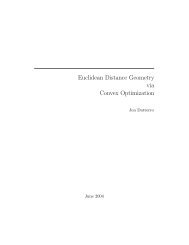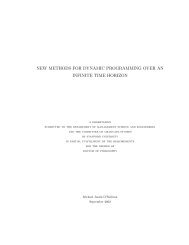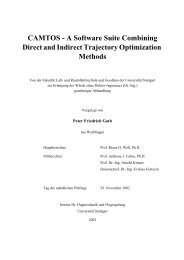Economic Models - Convex Optimization
Economic Models - Convex Optimization
Economic Models - Convex Optimization
You also want an ePaper? Increase the reach of your titles
YUMPU automatically turns print PDFs into web optimized ePapers that Google loves.
118 Chirstophe Deissenberg and Pavel Ševčík<br />
Batabyal, A (1996a). Consistency and optimality in a dynamic game of pollution control I:<br />
competition. Environmental and Resource <strong>Economic</strong>s 8, 205–220.<br />
Batabyal, A (1996b). Consistency and optimality in a dynamic game of pollution control II:<br />
monopoly. Environmental and Resource <strong>Economic</strong>s 8, 315–330.<br />
Dawid, H (1999). On the dynamics of word of mouth learning with and without anticipations.<br />
Annals of Operations Research 89, 273–295.<br />
Dawid, H and C Deissenberg (2005). On the efficiency-effects of private (dis)-trust in the<br />
government. Journal of <strong>Economic</strong> Behavior and Organization 57, 530–550.<br />
Dawid, H, C Deissenberg and P Ševčík (2005). Cheap talk, gullibility and welfare in an<br />
environmental taxation game. In: Dynamic Games: Theory and Applications, A Haurie<br />
and G Zaccour (eds.), Amsterdam: Kluwer, 175–192.<br />
Deissenberg, C and F Alvarez Gonzalez (2002). Pareto-improving cheating in a monetary<br />
policy game. Journal of <strong>Economic</strong> Dynamics and Control 26, 1457–1479.<br />
Deissenberg, C, G Feichtinger, W Semmler and F Wirl (2004). Multiple equilibria, history<br />
dependence, and global dynamics in intertemporal optimization models. In <strong>Economic</strong><br />
Complexity: Non-Linear Dynamics, Multi-agents Economies, and Learning,<br />
W Barnett, C Deissenberg and G Feichtinger (eds.), ISETE, Vol. 14, Amsterdam:<br />
Elsevier, 91–122.<br />
Dijkstra, B (2002). Time consistency and investment incentives in environmental policy.<br />
Discussion Paper 02/12.U.K.: School of <strong>Economic</strong>s, University of Nottingham, 2–12.<br />
Gersbach, H and A Glazer (1999). Markets and regulatory hold-up problems. Journal of<br />
Environmental <strong>Economic</strong>s and Management 37, 151–164.<br />
Hofbauer, J and K Sigmund (1998). Evolutionary Games and Population Dynamics.<br />
Cambridge: Cambridge University Press.<br />
Kydland, F and E Prescott (1977). Rules rather than discretion: the inconsistency of optimal<br />
plans. Journal of Political Economy 85, 473–491.<br />
Marsiliani, L and T Renstrom (2000). Time inconsistency in environmental policy: tax<br />
earmarking as a commitment solution. <strong>Economic</strong> Journal 110, C123–C138.<br />
McCallum, B (1997). Critical issues concerning central bank independence. Journal of<br />
Monetary <strong>Economic</strong>s 39, 99–112.<br />
Petrakis, E and A Xepapadeas (2003). Location decisions of a polluting firm and the time<br />
consistency of environmental policy. Resource and Energy <strong>Economic</strong>s 25, 197–214.<br />
Simaan, M and JB Cruz (1973a). On the Stackelberg strategy in nonzero-sum games. Journal<br />
of <strong>Optimization</strong> Theory and Applications 11, 533–555.<br />
Simaan, M and JB Cruz (1973b). Additional aspects of the Stackelberg strategy in nonzerosum<br />
games. Journal of <strong>Optimization</strong> Theory and Applications 11, 613–626.<br />
Vallee, T (1998). Comparison of different Stackelberg solutions in a deterministic<br />
dynamic pollution control problem. Discussion Paper, LEN-C3E. France: University of<br />
Nantes, 1–30.<br />
Vallee, T, C Deissenberg and T Basar (1999). Optimal open loop cheating in dynamic<br />
reversed linear-quadratic Stackelberg games. Annals of Operations Research 88,<br />
247–266.
















